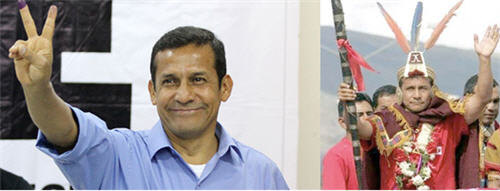“What should Peru do (1)?” appeared on June 4.
Ollanta Humala 51.3% of the vote against 48.7% for Keiko Fujimori.
Those who stayed up a good part of election night were rewarded with the news that the clear winner was Steven Levitsky, a Harvard professor of government who is teaching in Lima this year. (The winner of the “clearest analyst” trophy.) The New York Times quotes Levitsky: “Given the boom, the fact that only one in five (referring to an earlier Católica survey) want to maintain the status quo is extraordinary.”[1]
On TV, our winning pundit gave us the true results – Humala: 35% plus 17% donated by Fujimori (the negative vote against her), who herself received 20% plus 15% donated by Humala (the negative vote against him) and 10% and rising from the pro-business Lima press. Humala picked up a good few extra percentage points from the last-minute support he received from previous arch opponents Toledo and Vargas Llosa. Such is Lima politics.
What some of the other world’s press says
What the world’s press says can be summed up in two photos. The centre-left UK Guardian (6/6/2011) shows Humala in victory mode with tell-tale election-finger whilst the conservative Telegraph portrays him as an authoritarian ethnic-nationalist (right). Which is it?
What should Peru do (1)? was written a long week ago and published just before the election. The article worked out “what needed to be done” to close the gap revealed by a simple GNP graph. The article wondered if a political scenario could ever come about (Toledo plus Humala with a reformed Fujimorismo) that would produce the leadership necessary for a breakthrough on the basis of a high-trust, knowledge-based economy.
Mr. Humala has suggested Peru could raise corporate tax rates on miners to 45 per cent, from a current 30 per cent. (Miners also pay royalties of about 1-3 per cent.) The Financial Times says that the current rate is low by international standards and is below the 35 per cent rate levied in Chile.
Will Humala go ahead with the proposed rise? Certainly, he has suggested corporate taxes need to increase. “In Peru people know there has been economic growth, but at the same time it hasn’t necessarily reached them,” he told Reuters in a recent interview. “We think a tax must be crafted for windfall profits when they arise. Why can’t the state take a cut? It has to.” If it does, investors should be ready for higher copper prices, which in turn would be no bad thing for Peru.
But it will need much more than this tax rise to pave the way towards a knowledge-based economy.
[1] In a survey last month of voter sentiment by the Catholic University in Lima, just 22 percent of the respondents said that Peru’s current economic policies should be maintained by the next president.






